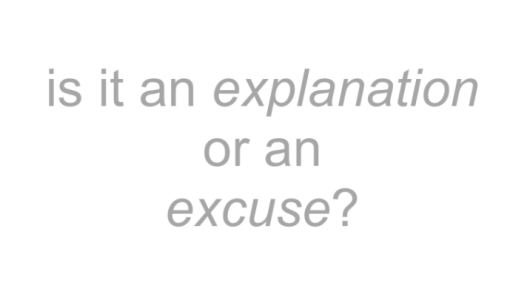Addictions, Forgiveness, Growth, Honesty, Mindfulness
EXCUSE OR EXPLANATION?

Excuse and Explanation, two words, two distinct actions that are not only confused, but often misused. One thinks one is explaining something when in fact they are actually using an excuse.
The dictionary defines excuse as a “defense, justification, and an alibi.” Where as explanation is “clarification, account and enlightenment.”
Despite their very different meanings we often make an excuse when we should be offering up an explanation. We should be clarifying when we are defending.
Here in the land of gratitude and trust, taking personal responsibility is one of our biggest goals. And that means when we are trying to right our wrongs, and be accountable for our behavior; an explanation is the right action, an excuse is not.
An excuse as we see from the definition is an alibi, a defense, it is removing ourselves from our behavior and not owning it. An explanation is clarifying for the other person why we behaved the way we do. It is enlightening them to who we are and where some of our less attractive traits come from. And then account, the root of accountability. The act of being accountable – the buck stops with us.
How often has someone given you an excuse when what you were really searching for was an explanation?
And how often have you created an excuse when you in fact should have been explaining?
When we make excuses we not only separate ourselves from our behavior, we separate ourselves from other people. We are not letting people in. We are erecting a fence made up of excuses to keep them out.
We more often than not make excuses for things we are embarrassed or ashamed of. Things we don’t want to own or impulses we cannot control.
“I ate three pieces of pie and blew my diet because my mother-in-law spent all day in the kitchen making it for me. I didn’t want to hurt her feelings. Total excuse.
And explanation would be “You know I lost all self- control. Once I had the first bite I couldn’t stop. I have been feeling really anxious all week about my job and the kids and I found myself right back in my comfort zone of over eating. I hate myself for doing it. I’m going to make every attempt to stick to my new eating plan, no matter what the temptation.”
That is an explanation. It’s your lack of self- control when under stress, not your mother-in-law’s fault for baking a pie.
We are all adept at making excuses for everything we do that we should not, be they excuses we make to ourselves or to others.
Who makes better excuses than the alcoholic or addict? They have a black belt in excuses. “I left my glasses at the office and I couldn’t see the car as I was backing out.” Big excuse. When the real explanation would be…..
“Alan and I stopped off at the bar after work. I drank way too much and ran into a parked car as I was pulling out of the lot.” That is an explanation. It’s owning you drank too much. Hey, I screwed up again. I have a problem.
Learning to be honest and explain our behavior and not dish up excuses is often the first baby step on the road to fixing ourselves.
Explanations might not always correct the problem. The ideal next declaration would be, “I know my drinking is way out of hand. I’m lucky I didn’t kill someone or end up in jail. Enough his enough. I’m going to an AA meeting tomorrow and really committing myself to the process this time.
Now that may not happen. Not then. It might take many more close calls or real disasters for someone to take the necessary steps to correct their behavior.
But explanations are a great place to start. In the smaller situations they totally clean your side of the street. In the bigger ones they are often the first public acknowledgement in admitting you have a problem that needs fixing. And it lets the other person into your world, tells them it’s not their fault and it often opens the door for them to help you.
So next time you start in with an excuse, pause and ask yourself, am I excusing behavior or explaining myself? Am I offering up an alibi to get myself out of trouble or am I enlightening those around me to who I really am? Am I moving closer to resolution and amending my ways or am I merely letting the parade of missteps continue?
Two similar words – two drastically different ways of tackling life.
